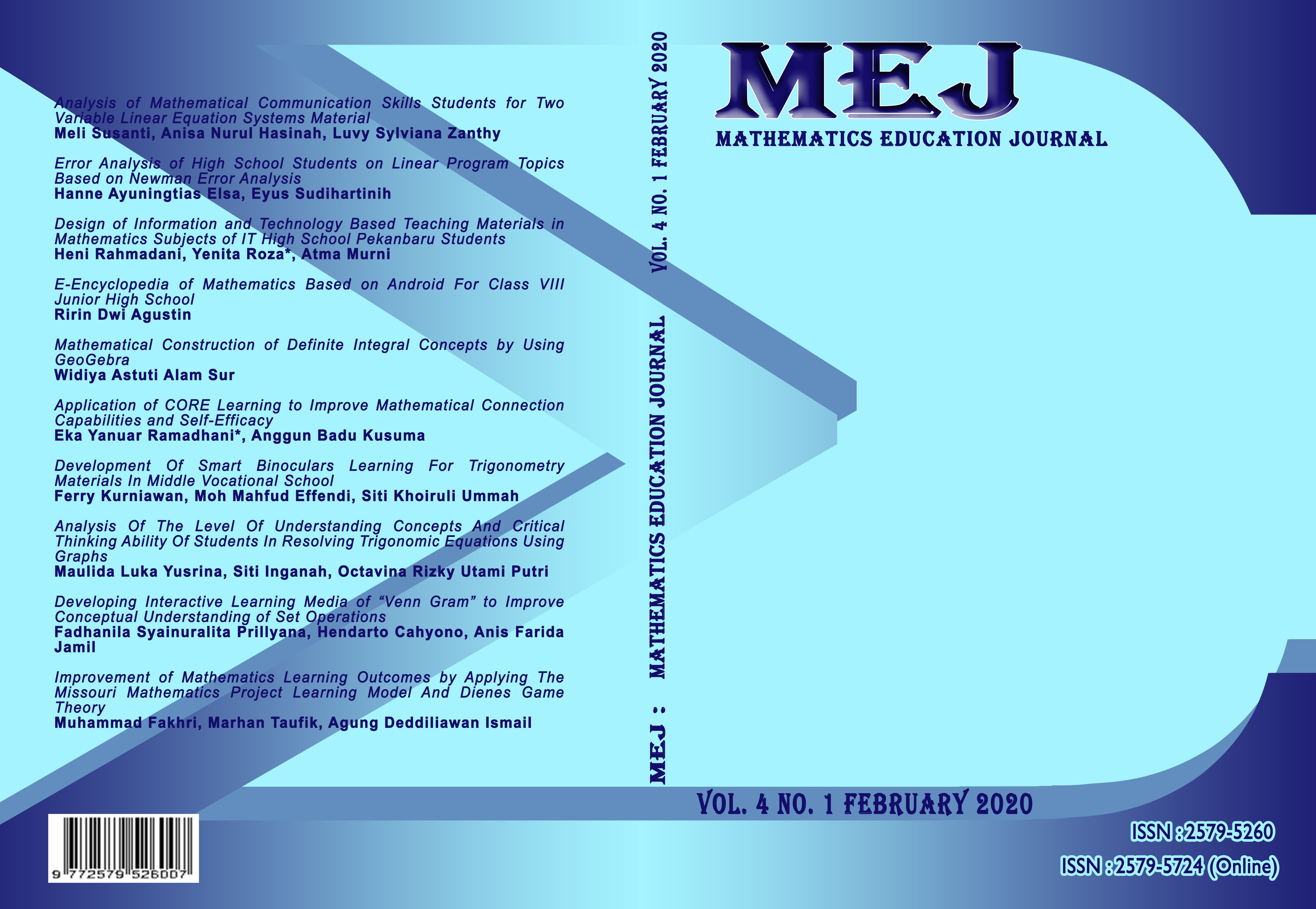Application of CORE Learning to Improve Mathematical Connection Capabilities and Self-Efficacy
DOI:
https://doi.org/10.22219/mej.v4i1.11470Keywords:
Mathematical connections, Self Efficacy, CORE (Connecting, Organizing, Reflecting, and Extending) learningAbstract
The study aimed to improve the skills of students mathematical connections and self-efficacy for grade VII D of SMP N 3 Sidareja in the 2018/2019 academic year through CORE (Connecting, Organizing, Reflecting, and Extending) learning on the topic of triangles and rectangles. The study was conducted in three cycles and each cycle consisted of planning, action, observation, evaluation, and reflection stages. The instrument used was a description test to measure the skills of students' mathematical connections given at the end of each cycle, while the instrument used to measure self-efficacy was self-efficacy questionnaire. Based on the findings, each cycle obtained an improvement. The first cycle obtained mathematical connection skills by an average of 64.74, 77.24 in the second cycle, and 81.41 in the third cycle. The average results of students self-efficacy in grade VII D in the first the cycle was 69.67, 76.05 in the second cycle, and 79.85 in the third cycle. Based on the data above, it can be drawn that there was an improvement of students' mathematical connection skills and self-efficacy from cycle I to cycle II and from cycle II to cycle III through CORE learning (Connecting, Organizing, Reflecting, and Extending).Downloads
References
Bandura, A. Self Efficacy: The Exercise Of Control. New York: W.H. Freeman Company. 1997: 33-55 Lappan, G. dkk. Getting to Know Connected Mathematics : An Implementations Guede. Upper Saddle River, New Jersey: Prentice Hall. 2002: 1-50 Lestari, K.E dan Yudhanegara, M.R. Penelitian Pendidikan Matematika. Bandung: PT.Refika Aditama. 2015: 49-52 National Council of teacher Mathematics. Principles and Standars for School Mathematics. Reston, VA:NCTM. 2000: 29-69 Santrock J.W. Psikologi Pendidikan. Jakarta: Kencana Prenada Media Group. 2014 Sabandar, J. “Berpikir Reflektif”. Makalah Pembicara Utama Seminar Nasional Matematika. Bandung. 2007: 1-17 Subekti, E.F dkk. (2016). Analisis Kemampuan Koneksi Matematis Siswa Kelas Vii Smp Negeri 1 Kembaran Materi Bangun Datar. Prosiding Seminar Matematika dan Pendidikan Matematika. Surakarta. 2016; 403-414 Sugiman. Koneksi Matematik dalam Pembelajaran Matematika di Sekolah Menengah Pertama. Jurnal Phytagoras. 4(1): 56-66 Sumarmo, U dan Permana, Y. Mengembangkan Kemampuan Penalaran dan Koneksi Matematis Siswa SMA Melalui Pembelajaran Berbasis Masala. Jurnal Educationist.2007; 1(2): 116-123
Downloads
Published
Issue
Section
License
Authors who publish with MEJ (Mathematics Education Journal) agree to the following terms:
For all articles published in MEJ, copyright is retained by the authors. Authors give permission to the publisher to announce the work with conditions. When the manuscript is accepted for publication, the authors agree to automatic transfer of the publishing right to the publisher.
Authors retain copyright and grant the journal right of first publication with the work simultaneously licensed under a Creative Commons Attribution-ShareAlike 4.0 International License that allows others to share the work with an acknowledgment of the work's authorship and initial publication in this journal.
Authors are able to enter into separate, additional contractual arrangements for the non-exclusive distribution of the journal's published version of the work (e.g., post it to an institutional repository or publish it in a book), with an acknowledgment of its initial publication in this journal.
Authors are permitted and encouraged to post their work online (e.g., in institutional repositories or on their website) prior to and during the submission process, as it can lead to productive exchanges, as well as earlier and greater citation of published work (See The Effect of Open Access).

This work is licensed under a Creative Commons Attribution-ShareAlike 4.0 International License.










